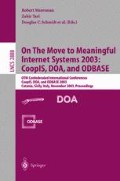Abstract
Management of product constituent fragments is essential for large scale logically or physically distributed projects. Geographically distributed development projects have special settings and needs – special attention has to be given to artifacts management because developers are likely to use different representation formats and a variety of tools for the artifact production. The question is: how can artifacts in different representation formats be related and managed?
Methodological support for artifacts management and traceability is presented in this paper. Product fragments from different development phases (i.e., requirements specification, design, code, test scenarios, and documentation) are interrelated through a conceptual domain model. Domain model is proposed as a means to capture information content despite heterogeneous representation. Given, a domain model with intra-related concepts and artifacts associated to the concepts we are able to interrelate heterogeneous artifacts and to predict and assess how one altered artifact may impact other artifacts. The approach covers the whole lifecycle of a system, enables artifacts’ management by associating them according semantics contained inside.
Access this chapter
Tax calculation will be finalised at checkout
Purchases are for personal use only
Preview
Unable to display preview. Download preview PDF.
References
Arkley, P., Mason, P., Riddle, S.: Enabling Traceability. In: Proceedings of the 1st International Workshop on Traceability, co-located with ASE 2002, Edinburgh, Scotland, UK, pp. 61–65 (September 2002)
Brasethvik, T., Gulla, J.A.: Natural Language Analysis for Semantic Document Modeling. In: Bouzeghoub, M., Kedad, Z., Métais, E. (eds.) NLDB 2000. LNCS, vol. 1959, p. 127. Springer, Heidelberg (2001)
Cormen, T.H., Leiserson, C.E., Rivest, R.L., Stein, C.: Introduction to Algorithms, 2nd edn. The MIT Press and McGraw-Hill, Cambridge (2001)
Dijkstra, E.W.: A note on two problems in connextion with graphs. Numer. Math. 1, 269–271 (1959)
Egyed, A.: Reasonings about Trace dependencies in a Multi-Dimensional Space. In: Proceedings of the 1st International Workshop on Traceability, co-located with ASE 2002, Edinburgh, Scotland, UK, pp. 42–45 (September 2002)
Farshchian, B.A.: A Framework for Supporting Shared Interaction in Distributed Product Development Projects, PhD thesis, NTNU, Trondheim, Norway (2001)
Frezza, S.T., Levitan, S.P., Chrysanthis, P.K.: Linking requirements and design data for automated functional evaluation. Computers in Industry 30(1), 13–25 (1996)
Gotel, O.C.Z., Finkelstein, A.C.W.: An Analysis of the Requirements Traceability Problem. In: Proceeding of the 1st International Conference on Requirements Engineering (ICRE 1994), Colorado Springs, Colorado, USA, April 1994, pp. 94–102. IEEE Computer Society Press, Los Alamitos (1994)
Greenspan, S., McGowan, C.: Structuring Software Development for Reliability. In: Microelectronics and Reliability, vol. 17, pp. 75–84 (1978)
Grünbacher, P., Egyed, A., Medvidovic, N.: Reconciling Software Requirements and Architectures - The CBSP Approach. In: Proceedings of the 5th IEEE International Symposium on Requirements Engineering (RE 2001), Toronto, Canada, pp. 202–211. Springer, Heidelberg (2001)
Letelier, P.: A framework for Requirements Traceability in UML based projects. In: Proceedings of the 1st International Workshop on Traceability, co-located with ASE 2002, Edinburgh, Scotland, UK, pp. 32–41 (September 2002)
Matulevicius, R.: MEIS requirements specification. Technical report, NTNU (2003)
Pinheiro, F., Goguen, J.: An Object-Oriented Tool for Tracing Requirements. IEEE Software 13(2), 52–64 (1996)
Pohl, K.: PRO-ART: Enabling Requirements Pre-Traceability. In: Proceedings of the Second International Conference on Requirements Engineering (ICSE 1996), Colorado, USA, pp. 76–85 (1996)
Pohl, K., Brandenburg, M., Gülich, A.: Integrating Requirement and Architecture Information: A Scenario and Meta-Model Based Approach. In: Proceedings of the Seventh International Workshop on Requirements Engineering: Foundation for Software Quality (REFSQ 2001), Interlaken, Switzerland (2001)
Ramesh, B., Jarke, M.: Toward Reference Models for Requirements Traceability. IEEE Transactions on Software Engineering 27(1), 58–93 (2001)
Rational Suite AnalystStudio. URL: http://www.rational.com/products/astudio/index.jsp
Strasunskas, D.: Traceability in a Collaborative Systems Development from Lifecycle Perspective. In: Proceedings of the 1st International Workshop on Traceability, co-located with ASE 2002, Edinburgh, Scotland, UK, pp. 54–60 (September 2002)
Solvberg, A.: Data and what they refer to. In: Chen, P.P., Akoka, J., Kangassalu, H., Thalheim, B. (eds.) Conceptual Modeling. LNCS, vol. 1565, p. 211. Springer, Heidelberg (1999)
Solvberg, A., Brasethvik, T.: The Referent Model Language., Technical Report. NTNU, Trondheim, Norway URL: http://www.idi.ntnu.no/~ppp/referent/
Watkins, R., Neal, M.: Why and How of Requirements Tracing. IEEE Software 11(4), 104–106 (1994)
Author information
Authors and Affiliations
Editor information
Editors and Affiliations
Rights and permissions
Copyright information
© 2003 Springer-Verlag Berlin Heidelberg
About this paper
Cite this paper
Strašunskas, D., Hakkarainen, S. (2003). Process of Product Fragments Management in Distributed Development. In: Meersman, R., Tari, Z., Schmidt, D.C. (eds) On The Move to Meaningful Internet Systems 2003: CoopIS, DOA, and ODBASE. OTM 2003. Lecture Notes in Computer Science, vol 2888. Springer, Berlin, Heidelberg. https://doi.org/10.1007/978-3-540-39964-3_15
Download citation
DOI: https://doi.org/10.1007/978-3-540-39964-3_15
Publisher Name: Springer, Berlin, Heidelberg
Print ISBN: 978-3-540-20498-5
Online ISBN: 978-3-540-39964-3
eBook Packages: Springer Book Archive

